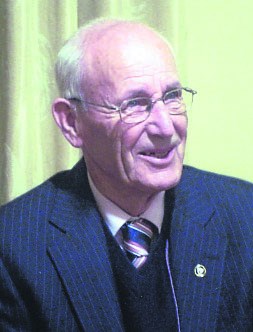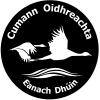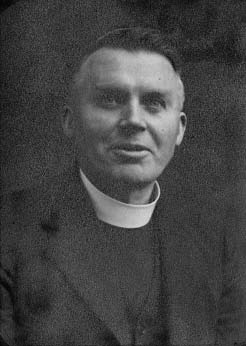by John McGagh
I asked Charlie about his early years and learned that he has no hang-ups about revealing his age.
I was born on the 8th of October 1921 and the name I got in baptism was Charles. I hadn’t a second name, but wasn’t I lucky enough to have one name? The name I took at confirmation was Joseph, because I was confirmed on St. Joseph’s Day.

Tell us about your early life.
My early life was in Kilgill, that would be about 700/800 yards from where I live now. That is where I was born. I had a brother older than me: John P. He is dead and a brother and sister younger than me. That’s Martin, who died recently, and Sarah (Sarah Burke), who is living in Gortroe. I went to school in Corrandrum N.S. and I started at the age of 4, becuase my mother was after dying and there would be no one at home to mind me. In Corrandrum N.S. I went on to reach 8th Class and I sept two years in 8th Class. I never went to secondary school. We had brilliant teachers in Corrandrum. The late Brendan Meehan was my teacher for most of my time there. In the Junior Classes I was taught by a Mrs. Hanley, who cycled from Cummer, in winter and summer because there were no cars.
When you left primary school what did you do?
I started working at home on the land, at beet and ploughing and harrowing, tilling, going to the bog.
When did you move from Kilgill?
We left Kilgill in 1940 and built a house in Cloonagh. I drew most of the sand for the house from Claretuam with horse and cart. It was built with mass concrete. The Second World War was on and it was impossible to get anything. If you got a bag of cement you would be lucky and if you got two bags you would be very lucky. After that I went driving lorries. My brother John P. had a lorry and I used to drive it. Then he got a better lorry and I took over the old one and I was drawing beet with that. I held onto it until 1954.
You mentioned the Second World War. Were they difficult years, the war years?
They were because you got nothing without the ration book. There was a half an ounce of tea allowed per person for the week. Now that was very little. There was no electricity, paraffin oil got scarce, candles were scarce, and likewise sugar. However, a beet grower could get a permit from the Sugar Company for two stone of sugar. The white flour was nearly gone out of existence altogether. It was imported before the war but during the war the flour was milled in Ireland. Wheat was milled locally in Wade’s and Furey’s Mills. There were coupons also for petrol.
What did you do for pasttimes during those years?
There wasn’t any transport so we didn’t go far. However, there were visiting houses. Our house was one of those visiting houses, where ten or more would come and exchange stories. If the story was interesting you would keep it in your head. We played card games. We mostly played 30, which was similar to 25. The difference between the two was if you turned a King or Ace when dealing you got 5 straight away. I remember one night we were in Flaherty’s house visiting during the war. We had only candlelight and we were going to Keaveney’s to the dance at ten o’clock, but one lad fell asleep in on the hob. So while he was asleep we polished his face with black polish and put a moustache and black eyebrows on him. When it was near ten o’clock we woke him up. And he said “well, do you know, I was almost asleep”. He didn’t know he was polished. We went to the dance and he was none the wiser.
What else did you get up to during those years?
I remember going to Irish classes in Corrandrum School during the war years. The classes were given by a Martin Duggan from Bawnmore.
Do you remember any of the things you learned there?
The three sharpest things: fichal con, dealg láibe agus focal amadáin. That is in English: a hound’s tooth, a thorn in the gutter and a fool’s advice. The three most playful things: piscín cait, meannán gabhair agus baintreach óg mná. That is: a cat’s kitten, a goat’s kid, and a young widow. The three things that are always growing: aois, cíos agus féasóg. That is age, rent and a beard.
What year did you marry?
In 1954 I got married. I married Annie Glennane from Corrandrum and my memories of that day are that it was one of the coldest days that ever came. It was the 27th of October and I know I was shaking. I don’t know was it the cold or was it nerves, but I believe it was from the cold. It was a terribly wet year because I saw the stooks of corn out in the fields on the 27th of October and I going on my honeymoon, and the water was half way up the stooks of corn. We were going to Cork, but the roads were all floods and we had to stop in Gort. We couldn’t get any further that day, but we did the next day.
When did the Post Office start?
The Post Office started in 1952. I was appointed Post Master and the Post Office was there until 13th April 1996.
I’m sure you will agree that it was a vibrant place to visit and to call into.
Well I suppose you would get as much news in it, as you would in the Tuam Herald.
You seemed to be kept busy, you hadn’t much time to sit back and relax during the day.
Oh! It was very busy for dole and children’s allowance and one thing we never did was shut the door for dinner hour. If some fella or some woman ate their dinner before us, well let them come, they were welcome then.
Do you miss the Post Office?
I don’t now, because I wouldn’t be able for it. I did miss it at first. I missed the customers very much.
What would be your own interests and pasttimes over the years?
Gaelic Games and ploughing.
Tell us about your involvement in Gaelic Games.
Well, I still go to games, but I was very involved at Club level years ago. I was secretary of Annaghdown for ten or eleven years. I have had an interest in Gaelic Games from a young age. I never plated that much football, but I played Minor football for Annaghdown ana a bit of Junior football. At that time there was no such thing as training sessions. If some fella had a bike he would carry you on the bar to the match. There were no cars, there were no dressing rooms, and there were no football boots. I remember playing a Minor match and I was right footed and another fell was left footed and we shared one pair of boots between us. It is hard to believe but it is true. You couldn’t ask your parents for the price of boots because they hadn’t it. Of course there were no showers in those days. The only shower you got was the one on the way home on the bike.
Going to matches far away must have been difficult?
It is very seldom that you really would go to matches far away. I remember I cycled to a Connacht Final at the age of 22 or 23.
Tell us of your involvement with the local club.
I don’t remember what year I got involved as Secretary, but the late Rickie Burke was Chairman for the same number of years as I was secretary, which was about eleven years.
You followed them through good years and not so good, through thick and thin.
I did, and over the years there were more thin than thick. However, there were a lot of very good footballers that played for Annaghdown.
You also mentioned ploughing amongst your interests. When did that start?
I started ploughing with horses in about 1941. I started at home on the farm. I thought I was good I suppose and I went to ploughing matches. You couldn’t go far away because there was no transport. You had to bring the plough in a cart with one horse under the cart and pull the other one behind you. If you went to a County match then that would be far away, you wouldn’t bring your own horses. There would be horses provided for you, but they might be two strange horses, that never worked together before. They might kick the daylight out of each other.
Had you a team of horses yourself?
I had yes. Well I had a horse and a half. I had a horse and a pony. Nowadays, they have 80-horse power ploughing and I had only one and a half.
How long did you plough in competition?
I finished ploughing in competitions in 1947. I still went to all the ploughing matches. I came back then in a competition in 1987 but it was with a tractor. My son Cathal had a sore back and I took his place. It was a Senior Level. I ploughed two matches that day and I didn’t plough since.
You must see lots of changes that have occurred in your lifetime?
Life has changed completely. I see the children going to school now and they are brought there by car and they are brought home by car. I walked to school, hail, rain, or snow and from the month of April until October we went barefoot. We would get new shoes then for October and we would wear them until the following April. Then come October they would be gone too small, anyway they would be worn out. Going barefooted during the summer was something every child did.
Are you happy with all the changes or do you think they are all for the good?
Yes, I think that they are all for the good, but I think that children nowadays are too dependent on their parents to bring them here, there and everywhere. Having said that it is not safe for them to be on the roads now without being supervised.
If you had your days over again would you change anything?
I don’t think so. I was happy enough all my life and I am happier now than I ever was. I have all my family around about me and that is very important.
It was my great pleasure to be asked by Corrandulla Community Council to interview Charlie Coen for this Christmas 2003 publication. Charlie who is very well-known near and far has been a neighbour and friend for many years. Constraints of space meant that I could only include a snippet of our conversation. This therefore, is a brief history of a very active and involved life, which thankfully is still going at a great pace. We talked about his family, his wife Annie and their children, Gerard, Liam (who died when he was fifteen and a half and whose memory still causes Charlie’s and Annie’s eyes to well up with sadness), Cathal, Anne Marie and Margaret. I mention this because one could only be impressed by the joy and happiness that his family and extended family bring to his life. There are many other areas of Charlie’s life, like his commitment to the Pioneer movement and the practice of his faith, which we didn’t get to touch on in this interview. However, what does come through is the abiding sense of humour coupled with great humanity, which is the man we all know and respect as Charlie Coen.
This article first appeared in Anach Cuain 2003. Charlie Coen died on 31 July 2011.


